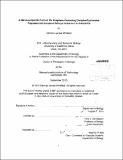A meiosis-specific form of the Anaphase Promoting Complex/Cyclosome regulates the oocyte-to-embryo transition in Drosophila
Author(s)
Whitfield, Zachary James
DownloadFull printable version (10.36Mb)
Other Contributors
Massachusetts Institute of Technology. Department of Biology.
Advisor
Terry L. Orr-Weaver.
Terms of use
Metadata
Show full item recordAbstract
Cell cycle transitions during mitosis and meiosis must proceed in an irreversible manner. At the heart of this is the Anaphase Promoting Complex/Cyclosome (APC/C), an E3 ubiquitin ligase. The APC/C targets its substrates for degradation, and thus progresses the cell cycle irreversibly forward. Many substrates of the APC/C have been identified in mitosis, but how the APC/C regulates meiosis is less well understood. The Drosophila gene cortex encodes a female, meiosis-specific activator of the APC/C. We set out to identify specific substrates of APCCort both genetically and biochemically. A genetic screen identified five deficiencies that suppress an arrest caused by low APCCort activity. In some cases, these deficiencies could be narrowed to regions containing only a few genes. IP/mass-spectrometry was also performed to identify interactors of Cortex. One hit was Matrimony, a potent inhibitor of Polo kinase during prophase 1. Cort and Mtrm can interact directly in vitro, while a mitotic APC/C activator, fzy/cdc20, cannot. Mtrm proteins levels are drastically reduced upon completion of meiosis, and this reduction is dependent on cort. When expressed in cell culture, Cort causes a proteasome dependent decrease in Matrimony protein levels. Cort and Mtrm also interact genetically, and overexpression of Mtrm in the early embryo causes developmental defects in a subset of embryos. This work contributes to our understanding of the meiotic cell cycle and the specific regulation that distinguishes it from mitosis.
Description
Thesis (Ph. D.)--Massachusetts Institute of Technology, Dept. of Biology, 2013. Cataloged from PDF version of thesis. Includes bibliographical references.
Date issued
2013Department
Massachusetts Institute of Technology. Department of BiologyPublisher
Massachusetts Institute of Technology
Keywords
Biology.